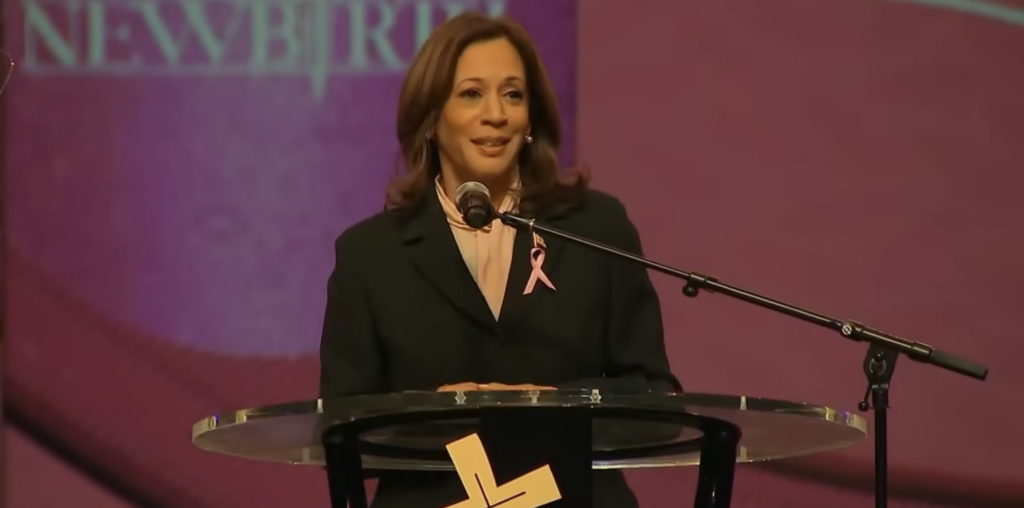
With two weeks left until Election Day, Vice President Kamala Harris has made visiting churches an integral stop along the campaign trail, urging voters to cast early ballots as part of her “souls to the polls” campaign.
Her latest stop was this past Sunday in the battleground state of Georgia, where voting is currently underway.
“Our country is at a crossroads and where we go from here is up to us as Americans and as people of faith,” Harris told the crowd at New Birth Missionary Baptist Church in Stonecrest, just outside Atlanta, on the same day she turned 60.
READ: Biden-Harris Inauguration Hosts Interfaith Prayer Service
The early voting push comes as Harris attempts to motivate Christians across the country — and Black voters in particular — who have traditionally been a part of the Democratic Party’s base to back her.
Black churches have played a key role in mobilizing African Americans to the polls since the Civil Rights Movement. The move also comes as Harris’ opponent, former President Donald Trump, has made inroads with Black men. President Joe Biden, when he was elected in 2020, won the party’s nomination, and later the general election, with large support from the Black community.
“We face this question: What kind of country do we want to live in?” Harris said. “A country of chaos, fear and hate, or a country of freedom, compassion and justice?”
In an MSNBC interview conducted by the Rev. Al Sharpton that aired Sunday, Harris added that she “must earn the vote of everyone regardless of their race or gender.”
“And what can be frustrating sometimes is to have journalists ask me this question as though one should assume that I would just be able to take for granted the vote of Black men,” she added.
Black Church outreach
DNC Chairwoman Jaime Harrison said “Souls to the polls” – a get-out-the-vote program aimed to counter Trump – is a key campaign element in the lead-up to the Nov. 5 election.
“Do we want a leader who is driven by hope and optimism or do we want a con man who is selling Trump-branded Bibles to line his pockets? I know who I want leading our country, I think you do, too,” she said. “But if we want to send Vice President Harris to the White House, we can’t do it alone. We all need to be part of this movement to empower hope and inspire a better, brighter future.”
Harrison said the DNC is “running on-the-ground programming to reach young Black voters in battleground states” like Georgia, Pennsylvania and Wisconsin.
The Pew Research Center survey, conducted this past summer, found that 86% of Black Protestants favor Harris. The vice president is also favored by 65% of Hispanic Catholics and 65% of Jewish voters.
Trump, meanwhile, has the support of evangelicals (82%) and White Catholics (60%). The former president has had the support of a majority of evangelicals in both the 2016 and 2020 presidential races. He has seen his support among Catholics, especially those who attend Mass once a week, during this current election cycle.
Overall, a poll last month by The Associated Press-NORC Center for Public Affairs, found that religion has not played a major role in this race. Only 43 percent of those surveyed said they thought Harris was “religious,” and just 35 percent said the same of Trump.
The election will very likely be decided by very slim margins since polls show that voters are evenly split between the two candidates.
But Civil rights activist Martin Luther King III, the son of Martin Luther King Jr. who previously served as head of the Southern Christian Leadership Conference, a civil rights group, said there’s only one choice for the White House.
He called Trump “an extreme, self-centered candidate who has an unprecedented level of disdain for democracy and our Constitution.”
Whether those statements can convince voters not to support Trump, despite high levels of inflation and issues surrounding immigration, remains to be seen.
Past statements about faith
The Harris campaign isn’t only about combating Trump. It’s also about highlighting her Christian faith. Harris’ upbringing, according to a recent New York Times feature, “embodies the multifaith, pluralistic and increasingly secular America she is bidding to lead.”
Harris’ mother was Hindu and her father a Christian. She is married to Doug Emhoff, who is Jewish.
The vice president said in an interview with Interfaith Youth Core that her “faith journey” started when she was a child, where she celebrated Hindu holidays and attended a Baptist church.
“On Sundays, my mother would dress my sister, Maya, and me in our Sunday best and send us off to the 23rd Avenue Church of God” in Oakland, Calif., she recalled.
At the National Baptist Convention in 2022 held in Houston, Harris, who sang in her church choir as a child, said growing up she “learned in the Bible of the many teachings about the ever-present tension between darkness and light.”
“And I learned, in those moments, how important it is to recognize the power of faith,” she said.
Last year, Harris told the African Methodist Episcopal Women’s Missionary Convention in Orlando that she often turns toward faith in “moments of uncertainty and confusion.”
“When the way is not clear, it is faith that guides us forward,” she added. “Faith in what we often cannot see yet know to be true.”
Tim Walz, Harris’ running mate, is also highlighting his Lutheran faith. He attended services on Sunday at Victorious Believers Ministries in Saginaw, Michigan.
“I’ve often said the folks don’t need to hear a sermon from their elected officials, but they should expect us to try and live one,” he said.
While Walz said he believes in the separation of church and state, he said, “You can’t separate what you learned and how you see people and how you care and how you worship from how you live your life.”

